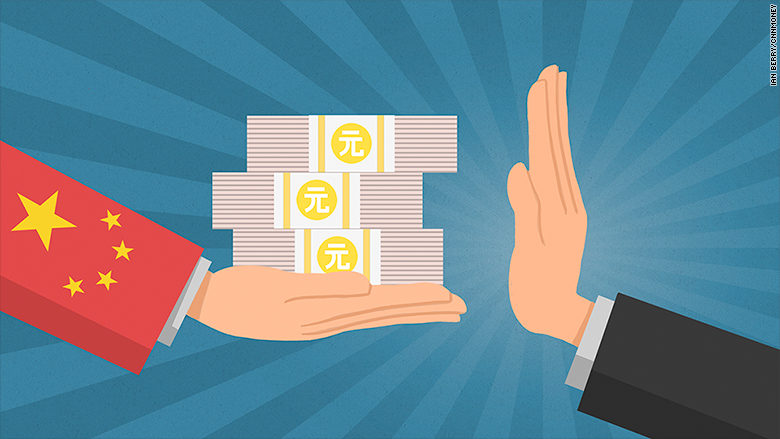
The party is over for some of China's most acquisitive companies.
Three of China's biggest conglomerates -- Dalian Wanda, HNA and Anbang Insurance -- have spent billions of dollars on deals around the world. Now the Chinese government is worried that they risk overextending themselves, and they are coming under pressure to sell assets.
The latest reversal came Friday, when Chinese regulators seized control of Anbang and removed its chairman. Analysts say the regulator is likely to offload some of the businesses Anbang snapped up during its global buying spree, such as New York's Waldorf Astoria hotel.
Related: China seizes control of deal-hungry insurer Anbang
Between them, Wanda, HNA and Anbang spent more than $50 billion in 2016 gobbling up assets around the world, according to research firm Dealogic.
Last year, their spending plummeted by almost 75%. That drop was echoed by a fall in overseas acquisitions by Chinese companies in general.
The Chinese government clamped down on companies borrowing heavily to make aggressive purchases abroad. That's because officials were worried about the flood of money pouring out of the country and the risks of Chinese companies making irrational or risky investments.
Here's how the biggest buyers became sellers:
Wanda
Wanda's billionaire chairman, Wang Jianlin, was once China's richest man and proud of his sprawling global business empire. Now he's offloading international properties and emphasizing his investments back home.
As well as real estate projects in cities such as Los Angeles, Chicago and Istanbul, Wang pumped money into entertainment, including the Hollywood studio that produced "Jurassic World" and "The Hangover" trilogy.
Related: China shuts down billionaire's golf courses
But in a sign that Wang's international ambitions were starting to clash with the ruling Communist Party's agenda, Wanda's $1 billion deal to buy Dick Clark Productions, the producer of the Golden Globes and other leading awards shows, fell apart last year.
Under pressure to raise funds to pay down debts, the company has also dumped real estate projects in the U.K. and Sydney. This month, Wanda agreed to sell its stake in Spanish soccer club Atletico Madrid.
It's not just overseas businesses Wang has been offloading. In July, Wanda sold several theme parks and dozens of hotels in China for around $9 billion.
HNA
HNA started out as a regional airline in southern China more than 20 years ago but went on a shopping spree in recent years, buying big chunks of major US and European companies.
Its sprawling empire grew to include the Radisson hotel chain, a big US technology supplier, a large stake in Hilton Worldwide (HLT) and about 10% of Germany's Deutsche Bank (DB).
But it has run into trouble as it struggles with debts estimated at $100 billion or more.
Related: A massive Chinese company is reversing its global spending spree
Investors have dumped the stocks and bonds of some businesses in HNA's vast web of subsidiaries. Credit rating agencies have downgraded debt linked to the company.
The company insists it's in good financial shape, but it has still been selling off parts of its operations to raise cash.
Recently it sold two prime plots of land in Hong Kong for $2 billion only 15 months after it bought them. It has also trimmed its stake in Deutsche Bank.
Anbang
Anbang was founded in 2004 as a provincial car insurer but has since ballooned into a global giant.
The firm is best known for its ambitious deal-making efforts, including the $1.95 billion purchase of the Waldorf Astoria, a failed $14 billion bid for the Starwood hotel chain, and unsuccessful talks with the Kushner family business over a Manhattan office tower.
The firm has spent more than $20 billion on deals since 2014, according to Dealogic. Its acquisitions included life insurers in the Netherlands and South Korea, and a Belgian bank.
Things began to turn sour last year, when chairman Wu Xiaohui was reportedly detained by Chinese authorities.
Related: A Chinese takeover of the Chicago Stock Exchange just got blocked
An investigation into the company culminated in the Chinese government seizing control of Anbang this week. Wu has been removed from his post and is being prosecuted for "economic crimes."
A statement from Shanghai prosecutors carried by Chinese state media said Wu had been indicted for fraudulent fund-raising and improperly taking company assets.
The insurance regulator may now seek to sell off a lot of the businesses Anbang bought, according to Brock Silvers, managing director of Shanghai-based investment firm Kaiyuan Capital.
-- Sherisse Pham and Nanlin Fang contributed to report.


